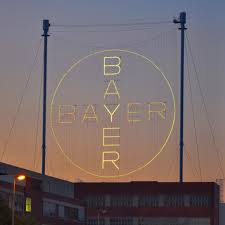20
May
Bayer, in Takeover Bid for Monsanto, Would Become World’s Biggest Farm Chemical Supplier
(Beyond Pesticides, May 20, 2016) With Monsanto’s earnings forecast cut and shares down 19%, Bayer AG has made a takeover bid for the company, worth $42 billion, in an attempt to swallow the global seed producer and become the world’s biggest farm chemical supplier. Although the terms of the proposal have not yet been disclosed, Bayer confirmed the bid to Bloomberg News, and Monsanto said it is reviewing the offer. If the offer is accepted, it could be the biggest acquisition globally in 2016, and the largest German deal ever, according to Bloomberg data analysis. Bayer is known for a wide range of products, from aspirin and birth control to flea and tick collars and insecticides. Monsanto is the creator of the widely used and controversial herbicide formulation Roundup, which has glyphosate as its active ingredient.
 In order to finance the takeover, Bayer may consider selling off its stakes in its animal health business and plastics/foam chemicals business (Covestro AG), worth an estimated $6 billion and $5.5 billion, respectively. The takeover would solidify both companies in certain ways; Monsanto would strengthen Bayer’s seed business, while a deal with Bayer would help reduce Monsanto’s reliance on the agricultural industry.
In order to finance the takeover, Bayer may consider selling off its stakes in its animal health business and plastics/foam chemicals business (Covestro AG), worth an estimated $6 billion and $5.5 billion, respectively. The takeover would solidify both companies in certain ways; Monsanto would strengthen Bayer’s seed business, while a deal with Bayer would help reduce Monsanto’s reliance on the agricultural industry.
There has been a flurry of activity and mergers in the big agricultural and chemical industries lately. In December 2015, chemical giants DuPont and Dow Chemical Companies announced that their boards of directors unanimously approved a merger of their companies through an all-stock deal, valuing the combined market capitalization at $130 billion. Then, in February 2016, China National Chemical Corp. acquired Syngenta AG, months after a failed attempt by Monsanto to takeover Syngenta. Many of these big agricultural and chemical companies have been struggling to cope with falling demand for farm chemicals due to falling crop prices and a strong dollar, and may believe that a merger will provide longer-term security.
However, for the billion-dollar agrochemical industry, a merger is likely to only provide short-term stability, increase the wealth of top executives, and raise the cost of food, as the new corporation will create a near monopoly that will allow it to increase prices. In the long-term, the market will reveal that relying on the promotion of chemical-intensive agricultural practices is not a sustainable business practice. Chemical-intensive (or conventional) agriculture depends on chemical fertilizers and toxic pesticides that have been shown to reduce soil organic matter and decrease the diversity of soil biota. These chemical inputs contaminate waterways leading to eutrophication and “dead zones,” where nothing is able to live or grow. Eventually, as chemical intensive agriculture depletes organic matter in the soil and there is nothing left with which to grow food or sustain life, chemical inputs will become obsolete. Sustainability advocates say that the only way that the agricultural industry can create a sustainable business model is to produce products that are compatible with organic agriculture.
While some argue that organic is too expensive, the simple fact is that chemical companies are able to externalize the social cost of their products in the form of eutrophication, soil erosion, harm to wildlife, healthcare costs to consumers, and numerous other adverse effects. Some researchers calculate the adverse impacts to health and the environment to be as much as $16.9 billion a year (Tegtmeier and Duffy 2004). If consumers paid the true cost of conventional food production, prices for conventionally grown goods would certainly be more expensive than organic products, which are certified through a process that protects human health and the environment.
Good organic practices work to build the soil and maintain an ecological balance that makes chemical fertilizers and synthetic pesticides obsolete. Claims that organic agriculture cannot feed the world because of lower yields are contested by scientific studies showing that organic yields are comparable to conventional yields and require significantly lower inputs. Organic agriculture advocates say that it is not only necessary in order to eliminate the use of toxic chemicals, but to ensure the long-term sustainability of food production.
For further information, check out our webpages on Organic Agriculture.
Source: Bloomburg News
All unattributed positions and opinions in this piece are those of Beyond Pesticides.










